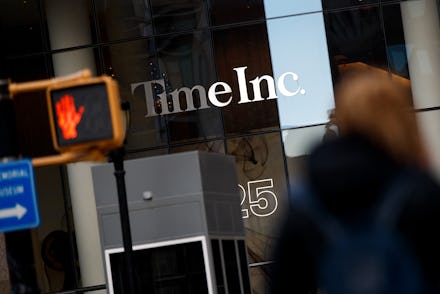Dismay and concern grows over Koch brothers’ involvement in Time Inc. acquisition

The announcement of the Koch brothers’ partnership with Meredith Corporation’s multi-billion-dollar takeover of Time Inc. has prompted a flurry of speculation over what the conservative Kansas-based billionaires might hope to gain from their investment in a prestigious but struggling media company.
The deal for the Des Moines-based Meredith Corp. to buy Time Inc. looks to be final and is set to close in the first quarter of 2018. It is a victory for Meredith, the Iowa-based media company that had for years sought to buy Time Inc. The sale was made possible in part by Koch Industries’ Charles Koch and David Koch, who offered $650 million in preferred equity through Koch Equity Development to help Meredith complete the transaction for around $2.8 billion.
The Koch brothers hold conservative and libertarian views and for years have sought to influence politics through various means, including political donations and the creation of conservative think tanks. Their interest in a New-York based media company the size of Time Inc. has raised eyebrows and led to suspicions they will seek to use the media titles to influence the masses.
“They wouldn’t have gone into this venture unless they thought of it as a sound business move,” Dan Schulman, Mother Jones’ deputy D.C. bureau chief and author of the 2014 Koch family biography Sons of Wichita, said in a phone interview Tuesday. “But they’re always looking for influence, wherever they can get it.”
Schulman said the Kochs’ involvement in the deal alone has the possibility of affecting editorial coverage, even if the the two didn’t explicitly call the shots.
“Influence works in different ways and it’s not always overt,” he said. “It’s just by virtue of the fact that they are major financial backers that can have an effect on the way things are covered.”
Through spokesman Steve Lombardo, the Kochs denied they will seek to influence the editorial coverage of Time Inc., which includes titles like Time and Fortune alongside lifestyle publications such as Southern Living and Food & Wine. Lombardo stressed to the New York Times the brothers’ involvement was “passive” and “similar to that of a bank.”
In a press release, Meredith Corp. said Koch Equity Development would not have a seat on the company’s board of directors and “will have no influence on Meredith’s editorial or managerial operations.” However, media reporter Alex Weprin noted on Twitter that a Securities and Exchange Commission filing about the deal allows for the Kochs to meet with Meredith executives four times a year to discuss business matters. They’ll also have the ability to “designate one observer” to sit in on board meetings.
But current and former Time Inc. staffers aren’t so sure about the Kochs’ so-called “passive” involvement. Publicly and privately, questions have been raised over the Kochs’ intentions, particularly as the overall magazine industry continues to struggle as print advertising dollars dry up or move to platforms like Facebook and Google.
Whether the Koch brothers will influence the company’s journalism was one of the first questions asked at a Time Inc. town hall Monday, an attendee — who asked their name be withheld for privacy reasons — told Mic. Meanwhile, the New York Times reported Monday that two meetings about the acquisition became “somewhat contentious” as staffers fretted over the company’s future and editorial integrity.
Ex-staffers have expressed similar concerns. Charles Alexander, who spent 23 years at Time as a writer and editor before taking a buyout from the company in the early 2000s, said he didn’t think the Kochs will remain “passive” as promised.
“I’ve been in contact with many former editors and writers, and we’re all very concerned about what the Kochs may have in mind in the long term,” he said in a phone interview Tuesday.
Alexander acknowledged Time Inc. has struggled for years to find its footing as magazine subscriptions and circulations shrink, but said he doubted the Kochs bought into the magazine business for philanthropic reasons.
Meanwhile, John Huey, Time Inc.’s former editor-in-chief who stepped down in 2012, told Politico he also fears the Koch influence on the company’s titles.
“It’s difficult to believe the Kochs would pay a premium to buy into the print media model without the hope that they can harness Time and Fortune to further their agenda,” he said.
Richard Stengel, who served as Time’s managing editor from 2006 to 2013, seemed to agree on Twitter.
“Meredith wanted to buy Time Inc. back in 2012, but didn’t want Time magazine,” Stengel tweeted Monday. “The difference now is the Koch brothers’ money. Even though they won’t have a seat on the board, [it’s] hard to imagine they won’t influence the editorial side.”
There are also concerns about how badly the company’s reporters and editors will be hit in impending layoffs. The Financial Times reported Monday that hundreds of jobs at Time Inc. could be slashed once Meredith Corp. completes its acquisition — and that Meredith is considering selling some of Time Inc.’s best-known titles, including Sports Illustrated and Time.
The Kochs have previously dabbled in media as a vehicle to influence public opinion, funding titles like the now-defunct Libertarian Review and Inquiry in the 1970s and 1980s through the Koch-founded libertarian think tank the Cato Institute. But a match with Meredith, which publishes largely apolitical lifestyle magazines like Family Circle, has seemed to some observers an odd pairing.
The suspicion alone that titles like Time could turn into Koch-approved conservative publications is, for former Time staffers like Alexander, too much to bear.
“I personally would almost rather see it die an honorable death than have it live on as some sort of organ of the conservative media,” he said.